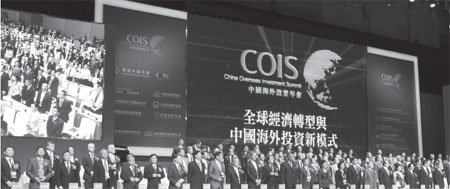Smart strategies ensure successful 'going out'
Updated: 2012-08-23 06:42
By Li Tao(HK Edition)
|
|||||||
|
The Second China Overseas Investment Summit (COIS) opens in Hong Kong on Wednesday. Sophie He / China Daily |
Investment forum explores ways for Chinese firms to expand overseas while avoiding risks
The continuous transformation of the global economy and the rapid development of the mainland's economy have opened up huge opportunities for Chinese firms to expand overseas, but they need to employ smart strategies and innovative business models in conducting outbound investments to ensure long-term competitiveness and success, business leaders and policy makers told the Second China Overseas Investment Summit (COIS) in Hong Kong on Wednesday.
The global economy is currently undergoing profound adjustments both in economic structure and operation mechanism and, with China and other major emerging economies becoming the world's major growth engine, the acceleration of the "going out" strategy has become an inevitable trend in China's sustained economic development, said Li Haifeng, minister of the Overseas Chinese Affairs Office of the State Council, referring to the Chinese government's policy of encouraging enterprises to expand overseas.
Over the past decade, China's outbound investment has grown by 25 percent, outpacing the 6-percent increase in the number of traditional investors from developed countries. And, currently, the growth momentum of Chinese overseas investment is at an unprecedented strong level, with outbound direct investment (ODI) surging 21.7 percent to $68.81 billion in 2011 - equivalent to 2.3 times the country's total ODI during the 10th Five-Year Plan period.
Speakers at the forum suggested that the current global economic environment could offer great investment opportunities for Chinese enterprises as the impact of the financial crisis gradually plays out.
With many countries having committed themselves to reindustrialization and developing the real economy, Chinese companies are likely to see increasing opportunities for mergers and acquisitions (M&As) at relatively low prices, according to Huang Mengfu, vice-chairman of the 11th National Committee of the Chinese People's Political Consultative Conference (CPPCC).
The achievements made so far are great and the opportunities are rich, but the challenges ahead are also huge, he added.
Although Chinese enterprises have made tremendous progress in outbound investment over the years, the activities remain at a preliminary stage as they have put too much emphasis on business scale and expansion speed, and failed to create a competitive industrial chain, Wang Zhongyu, vice-chairman of 10th CPPCC National Committee, told the forum, themed "Global Economic Transformation and New Approaches to China's Overseas Investment."
"A majority of our companies that are 'going out' lack the ability to control risks and formulate global resources strategies to achieve the optimal allocation of resources and maximize the benefits," Wang said. "Scientific formulation and effective implementation of investment strategies that cater to our real needs is the major issue that needs be addressed during the 'going out' process."
He urged mainland companies to adopt more innovative models for their overseas investments. Besides setting up sales outlets and assembly lines overseas, they should consider engaging in other business activities, such as M&As, equity swaps and brand promotions.
As for the areas of investment, Chinese enterprises should shift their focus to high-tech and high value-added activities from resources exploration, processing and manufacturing, Wang added.
Supachai Panitchpakdi, Secretary-General of the United Nations Conference on Trade and Development (UNCTAD), advised Chinese companies to figure out a smart strategy in promoting overseas investment to sustain growth and move up the value chain.
"As the Chinese economy becomes more knowledge and capital-extensive, there may be advantages for Chinese firms to relocate labor-extensive activities to other developing countries, particularly African nations," he told the forum, adding that emerging populations in large markets could provide huge business potential for Chinese manufacturing and services firms.
Chinese companies, Supachai said, should take corporate social responsibility very seriously overseas. "I would urge Chinese business leaders to avoid mistakes made in the past by some multinationals. Environmental damages and social conflicts can, and will, hamper the global operations of that company," he said.
China's "going out" strategy will also benefit Hong Kong in a very direct way, as 65 percent of mainland's ODI was either put into the city or conducted through the city, data from the Ministry of Commerce showed.
"As an important strategic platform for China's 'going out' activities, Hong Kong is experiencing a wonderful change in its role and enjoys continuous prosperity and stability," said Chan King-wai, a CPPCC member and chairman of the Hong Kong China Chamber of Commerce.
Unlike the past when Hong Kong mainly regarded the mainland as a place to make investment, the city has become a platform for mainland enterprises to invest and look for business opportunities overseas, a new trend that is irreversible in the future, he said.
Chief Executive Leung Chun-ying, who also addressed the forum, stressed that the motherland's continued support for Hong Kong is the city's most unique advantage.
"Since China's reform and opening up, Hong Kong - leveraging on its leading financial, trade and professional services - has been providing support in terms of capital, technology, experience and international contacts for the country's development and modernization.
"We expect more mainland enterprises to collaborate with Hong Kong enterprises to implement the 'going out' strategy through the city, to contribute to the prosperity of the country," Leung said.
litao@chinadailyhk.com
(HK Edition 08/23/2012 page2)
